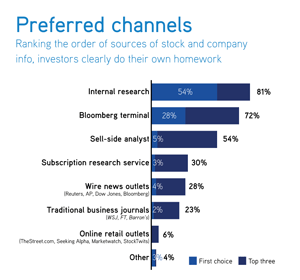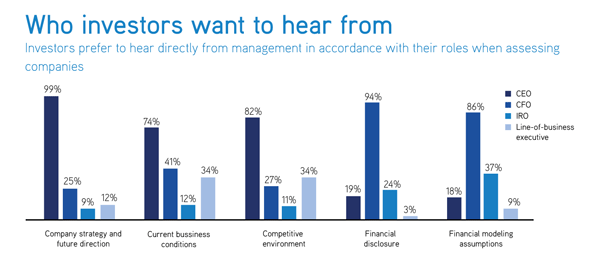Edelman’s survey indicates the importance of qualitative information to the buy side
Click here for the complete report on this survey
A company’s numbers do not stand on their own: that’s what more than 150 US buy-side analysts and portfolio managers across the spectrum of investment styles overwhelmingly tell us in a proprietary study conducted in April 2015 by Edelman’s IR team. The goal of our survey was to gain insight into the value investors place on qualitative information – non-quantitative information intended to convey an understanding of a company’s strategy, competitive position, products, business performance and future developments – in the investment process.
Edelman’s study finds about 85 percent of respondents agree that qualitative information helps them evaluate a company’s forward-looking information and guidance, helps them validate an existing investment thesis, and helps them understand and interpret historical results. Far from treating an investment narrative as noise or hype, 60 percent say a well-articulated, forward-looking strategy helps them better understand and value a company. And more than half – 54 percent – say having an articulated long-term strategy that fits their investment thesis helps them look past one or two quarters of earnings misses.
The ‘vision thing’ is important: the majority of investors polled find management’s vision and anticipated opportunities and vulnerabilities to be extremely important in evaluating companies, and want to hear qualitative guidance about trends in various financial metrics, even in the absence of quantitative ranges.
Differing viewpoints
Investment style also plays a role. Growth-oriented and GARP investors place a higher value on what they can hear from management – vision, depth of bench and ‘confidence’ in targets – compared with value-centric and hedge investors. We surmise that’s because they are looking to fill the white space that drives their projections, which is a function of good communications (see Value of information type, below).
Investors indicate they overwhelmingly want their information directly from the company, specifically from senior management. And while well-written and prepared conference call scripts are important, the buy side derives more value from one-on-one conversations and Q&A than from scripted remarks by almost a 25 percent margin.

It is also noteworthy that while media in general is not ranked as highly as direct communications with management, trade media out-scores business and financial media by an 11 percent margin as a reliable source of information for investment decisionmaking. This last point brings with it the implication that industry sources and competitive viewpoints are also highly valued.
Our results show the vast majority of investors choose their own internal research, including direct communications with the company, as their number one source of information, followed by their Bloomberg terminal and sell-side analysts (see Preferred channels, right).
Authoritative voice
Our survey reveals that the CEO is preferred as the voice of the company’s strategy, market and competitive environment, while the CFO’s authority on those topics is seen as much lower. In fact, line-of-business executives are considered more authoritative than CFOs on the competitive environment. On the other hand, CFOs are the preferred voice for financial disclosure and modeling assumptions, both areas where the investor relations officer is strongly preferred over even the CEO.
 Breaking down the data a bit more (see Who investors want to hear from, above), we find that growth-oriented fund managers also want to hear from the chief financial officer in company strategy conversations (44 percent) and the IRO for financial disclosure conversations (44 percent).
Breaking down the data a bit more (see Who investors want to hear from, above), we find that growth-oriented fund managers also want to hear from the chief financial officer in company strategy conversations (44 percent) and the IRO for financial disclosure conversations (44 percent).
In the end, the IRO plays a crucial role in co-ordinating and brokering conversations with the financial community and ensuring the right messages are told, by the right voice, to the right investor. Corporate communications officers often play a similar role with media, industry analysts and other influencers. According to our survey, responsiveness is the most important factor in an effective investor relations program, followed by high-quality earnings calls, personal conversations with management and investor conferences/investor days.
The majority of investors agree that ‘investing is like driving forward while looking in the rear view mirror’, and non-quantitative information provides critical inputs into the state of the road ahead. Edelman’s survey reveals that management teams must proactively tell their company’s story to the financial community – and numbers alone, while important, are not enough to ensure optimal valuation. While the numbers are the proof points, our survey validates Edelman’s experience that best practice IR gives context to the results, provides color for forward projections, uses anecdotes to convey successes, and offers insight into management’s thinking.
For more detail on these findings, please follow @Edelman_ FinCom, or click here for the complete report on this survey.










